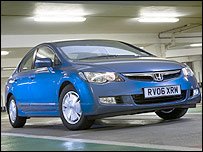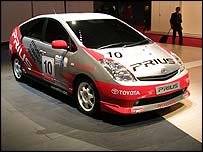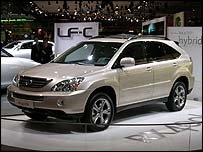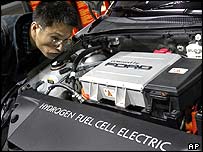Soaring gas prices and a tax deduction may sway some buyers, but if you'd rather go cheap than go green, nirvana is still a ways off.by
Des ToupsHybrids, those fuel-sipping cars that use both gasoline and batteries but never require recharging, seem to make a world of sense as gasoline prices blow past $2 a gallon. They pollute less, they consume less, and they make you feel good. But do they make sense if you’re simply trying to save money? Not yet.
Hybrids are an expensive way to save gasoline. If you spend more on a hybrid car than you'd have spent otherwise, you're unlikely to ever get your money back -- even if you got rid of a gigantic, fuel-sucking SUV. Right now, a cheap compact is a better buy than an expensive hybrid. A couple of things could help tilt the balance for you:
The IRS has decided that hybrid vehicles qualify for a one-time "Clean Fuels" tax deduction of up to $2,000. If you’re paying the top 35% rate, that’s $700 off your bill. This deduction applies to hybrids bought in 2004 and 2005; it's scheduled to disappear for 2006.
A number of new hybrids -- sedans, SUVs, even trucks -- are on the way. At least one of the new models is no more costly than its similarly sized, gasoline-powered kin.
The choices
Only a true fuel miser would appreciate Honda's tiny >Insight, A featherweight two-seater with limited cargo space. At about $21,000, it's powered by a tiny, three-cylinder engine with an occasional assist from the batteries, which recharge by reclaiming the energy expended when you slow down or brake. The EPA rates the automatic version at 57 city, 56 highway, but enthusiastic owners report as much as 100 mpg if driven ultra carefully.
Sedan buyers won't get that kind of mileage, of course. The two best sellers are Toyota's Prius and Honda's Civic Hybrid. Both start around $22,000. Honda also makes an Accord Hybrid, which has a unique twist in that the power from its small electric motor is used primarily to boost performance. It's about $30,000.
Both Ford and Toyota have hybrid sport-utilities on the market, and Chevrolet, GMC and Dodge have hybrid pickups on sale or in the works.
Forgo an SUV and save a bundle
Whether or not the purchase of one of these fuel-sipping machines makes financial sense depends on the alternative. You'll save a small fortune if you opt for a hybrid over a larger sedan or sport-utility. Buy that Civic Hybrid instead of a 20-mpg Accord V-6 and you’ll see a savings of $656 a year on $1.50 gasoline, not to mention a few thousand on the purchase price. Commute in the hybrid rather than a 13-mpg sport-utility and you’d save $1,262, not to mention a tankful or two of guilt.
Apples-to-apples comparisons are less kind. A garden-variety Civic LX sedan sells for about $16,500 and returns 31 mpg in the city, 38 on the highway. Using the city mileage figure (which most people would achieve in day-in, day-out driving), you’d spend $725 a year to drive 15,000 miles on $1.50 gasoline. The Civic Hybrid would consume $469 worth, a savings of just $256 a year. (At $2 a gallon, the savings is about $342 a year.)
Without the tax deduction (and recognizing the time value of money), a hybrid owner would never earn back the $4,000-plus premium for his car. Lop $700 off the cost of the hybrid and the picture improves, but it’s still no deal. But every dime increase in the price of gasoline pulls the break-even point closer.
Some states offer incentives that sweeten the deal even further. Oregon, for example, offers dollar-for-dollar credit against state income tax up to $1,500. Maryland offers a break on sales tax. There are little perks, too: Several states allow solo drivers in these hybrid cars to use the carpool lanes, and some cities offer free parking. Check with your local bureaucrats before you buy.
Some alternatives
There are alternatives for both the economy- and ecology-minded. A Volkswagen Jetta TDI, for example, is a diesel-powered sedan that sells for $1,240 more than its gasoline-powered version, yet achieves 50% better economy. Diesel fuel economy is less fragile than that of hybrids; driving style affects them much less. Their gutsy nature is well-suited to trucks and SUVs.
Many more "clean" diesels, built to take advantage of low-sulfur fuel coming in 2006, will show up on car lots soon.
There are many traditional gasoline-powered models that are just as clean as hybrids, achieve good mileage and cost much less. The Consumer Reports-recommended Ford Focus, for example, has an engine that qualifies for Partial Zero-Emission Vehicle status, achieves 27 city/36 highway, and starts at about $13,000 -- $7,000 less than the cheapest hybrid, even before rebates.
Before you shop
It's important that drivers realize that they will have a difficult time matching the advertised fuel economy for these hybrids. Hard acceleration, cut-and-thrust driving and using the air conditioner take an even bigger toll on hybrids' mileage than they do in a regular car. Real-world economy could be as much as a third less; still, 40 mpg is pretty impressive.
Don't ignore the traditional risks behind any car purchase: You're responsible now for maintaining two power sources, not one. Hybrids have proved reliable so far -- these are Hondas and Toyotas, after all -- but their history is limited. Warranties on the hybrid-related systems are eight years, but replacing those systems after the warranty expires could cost thousands. (The battery pack in a Honda is estimated at $3,000.) And resale value is still a big question mark.
So far, resale values for the Insight have been especially disappointing compared with most Hondas. Despite a $4,000-plus difference when new, the price gap between a 2-year-old Insight and a run-of-the-mill, 2-year-old Civic LX sedan is very narrow. That's a big opportunity for hybrid-vehicle fans who don't mind forgoing the tax deduction (which applies only to the original owners) but want to pick up one of these lightweight two-seaters on the cheap.
The Prius, on the other hand, is riding a wave of consumer demand, with new models commanding thousands over sticker and used examples are maintaining their value well. Projected depreciation is less than that of the Camry, for example.
And of course, though you never have to plug one of these babies into your wall socket, there are compromises -- such as less power -- you'd do well to research. You can read more about them at MSN Autos by following the links at left.
Source: moneycentral.msn.com
 Hybrid bus technology is similar to that used in hybrid cars and trucks, with options for both parallel and series drive train designs. These buses employ similar technology including regenerative braking, electric motors, and battery storage. One main difference is that most hybrid buses are coupling diesel-fueled engines with electric motors instead of the typical gasoline-electric hybrid configurations available in light duty vehicles. Maximizing the benefits from these buses requires optimizing the hybrid system for the transit bus routes, which might be affected by the terrain the bus travels or whether the bus frequently travels at freeway speeds or stays on city streets.
Hybrid bus technology is similar to that used in hybrid cars and trucks, with options for both parallel and series drive train designs. These buses employ similar technology including regenerative braking, electric motors, and battery storage. One main difference is that most hybrid buses are coupling diesel-fueled engines with electric motors instead of the typical gasoline-electric hybrid configurations available in light duty vehicles. Maximizing the benefits from these buses requires optimizing the hybrid system for the transit bus routes, which might be affected by the terrain the bus travels or whether the bus frequently travels at freeway speeds or stays on city streets. 








